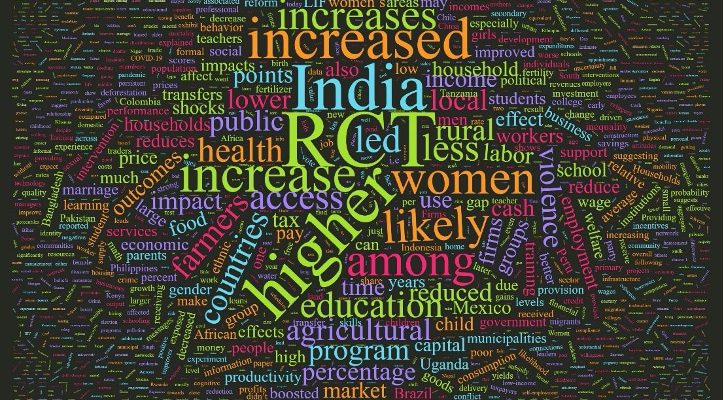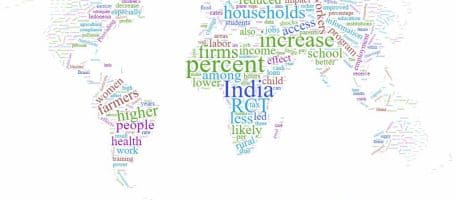
On 6-7 November 2020, Dartmouth University hosted the North East Universities Development Consortium annual conference in a virtual event. 225 papers (around 50 percent more than last year’s conference) were presented on a wide range of development topics, from agriculture and credit to tax and transport. Summaries and key takeaways of these papers were compiled in a bi-annual article written by David Evans and Almedina Music. As with previous years, INCLUDE extracted the papers (this year 67) written about, or with findings relevant for, countries in Sub-Saharan Africa, distinguishing as the authors did by research topic and noting the research method used next to each study (explanation in the box below).
#DID = Difference-in-differences
#ES = Event study
#FE = Fixed effects
#IV = Instrumental variables
#LIF = Lab in the field
#ML = Machine learning
#PSM = Propensity score matching
#RCT = Randomized controlled trial
#RD = Regression discontinuity
1. Households and human capital
- Helping secondary students in Zanzibar (Tanzania) to set goals for improvement on math tests led to better reported time use but not better test scores. These intermediate gains are largest for girls. (Islam et al.) #RCT
- Does providing e-readers to students in Lagos, Nigeria, boost test scores? Only if the devices had materials from the curriculum and were filling a gap in textbooks. (Habyarimana and Sabarwal) #RCT
- A teacher professional development for secondary school teachers in Rwanda boosted use of active instruction but did not increase students’ “academic outcomes or skills.” (Blimpo and Pugatch) #RCT
- Across 15 African countries, there is lots of variation in how much teachers are paid relative to other workers with comparable education and experience. However, on average across the countries, teachers are paid about the same per month and somewhat more per hour. (Evans, Yuan, and Filmer) You can read the authors’ blog postabout the paper here.
- Training teachers in targeted instruction in Ghana boosted student learning. Adding training for managers boosted the quality of management but didn’t further improve learning for students. (Beg, Fitzpatrick, and Lucas) #RCT
- Winning a lottery increases the willingness to pay for remedial education services much more for those who aren’t able to borrow money than for those who are. “Credit constraints limit access to educational programs” in Tanzania. (Burchardi et al.) #RCT
- After three years, on-site, in-person coaching had much broader impacts than coaching delivered through a tablet in South Africa. (Cilliers et al.) #RCT [You can also read Dave’s blog poston this paper.]
- “A multi-faceted program that integrates technology into education, provides ongoing teacher training and professional development, includes community ownership, and offers free primary education” boosts reading and math scores in rural Zambia. (de Hoop et al.) #RCT
- Providing computers and computer-assisted learning software to primary schools in Angola led to falls in teacher absenteeism and rises in student and teacher technological familiarity; but student learning didn’t rise. (Cardim, Molina-Millán, and Vicente) #RCT
- Sex education provided by near-peers in Botswana reduced pregnancy by over 40 percent whereas government teachers had a null effect and potentially increased pregnancy. (Angrist)#RCT
- Land reform 50 years on: population levels in Kenya are higher in the settlement schemes than in neighboring areas. School provision is at par with population levels, indicating that there is no impact of the reform on this public good in the long run. (Crespin-Boucaud, Boone, and Moradi)#RD
- In Ethiopia, despite worries about food insecurity in the wake of COVID-19, “food consumption and household dietary diversity are largely unchanged or slightly increased by August 2020” relative to a year previously. (Hirvonen, de Brauw, and Abate)
- In Kenya, the COVID-19 pandemic drove over 20 percent of traders out of business and disrupted supply chains, while most cross-border traders switched to being domestic traders. Remaining traders rely on informal borders, with an increase in bribes paid and more frequent harassment by officials and the police. (Wiseman)
- A locust plague in Mali affected people in two ways. Prices went up in the short run because people knew the harvest would be smaller. “Children exposed in utero to the adverse effects of the locust plague suffer major health setbacks.” (Conte, Piemontese, and Tapsoba) #DID
- School feeding in Rwanda boosted student learning and closed gender gaps. “Back-of-the-envelope calculations suggest that providing school feeding yields an 11:1 return on investment.” (Mensah and Nsabimana) #DID
- A review of 34 mental health interventions in low- and middle-income countries shows positive impacts on economic outcomes, especially interventions that combine psychosocial and pharmacological elements. (Lund et al.)
- “Using manipulated portraits (thinner/fatter) of real Kampala [Uganda] residents, I first show that obesity is perceived as a reliable wealth signal.” Then, in a “real-stakes field experiment,” the research shows that “obese borrowers have easier access to credit: going from normal weight to obese is equivalent to increasing one’s income by 60 percent.” (Macchi) #RCT
- Preventive healthcare appointments are common in rich countries but not in poor countries. In Malawi, both the offer of HIV testing appointments and financial commitment devices increase HIV testing among high-risk men, but appointments are much more effective. (Derksen et al.) #RCT
- Are non-financial incentives effective to motivate community health workers? Providing an honorary award at a public ceremony boosted performance, with impacts on child health. Showing a video that demonstrates the consequences of health worker choices was less effective. (Fracchia, Molina Millán, and Vicente) #RCT
- A law that banned female genital cutting in Senegal reduced the prevalence of the practice and increased investments in girls’ education. (Hombrados and Salgado) #DID
- Among “jobseekers in Egypt, women are more sensitive to long commutes, and value flexible schedules and on-site daycare more than men.” (Feld, Nagy, and Osman) #RCT
- Registering sugarcane blocks in the wife’s name in Uganda improves two dimensions of women’s economic empowerment: access to resources and agency, with marginal impacts on personal welfare outcomes. In contrast, a behavior change intervention has strong impacts on personal welfare impacts. (Ambler, Jones, and O’Sullivan)#RCT
- “A one time large unconditional cash transfer (in rural Kenya) improves women’s control of household resources but not the frequency of physical and sexual intimate partner violence. Combining a light touch psychological intervention targeting self-believes with the cash transfer reduces the violence index by 0.14 SD.” (Mahmud, Orkin, and Riley)#RCT
- A program aiming at reducing intimate partner violence (IPV) in Rwandaincreased “The program may have increased violence because men backlashed against the perceived threat to their identity posed by program messages about women’s empowerment, and against their wives’ more progressive gender attitudes and aspirations. (Cullen et al.) #RCT
- In the past, some ethnic groups across African countries practiced twin infanticide. Today, twin mortality is no higher for those groups than for other others. Phew. Uses data from 23 countries. (Fenske and Wang) #FE
- African women in former British colonies tend to marry later and have lower fertility than women in former French colonies. But those effects tend to disappear close to the sea, where market access is higher. (Canning, Mabeu, and Pongou) #RD
- “In societies characterized by the co-existence of strong son preference and worse maternal health conditions, women with first-born girls exhibit a lower likelihood of survival into older ages. This is likely due to harmful fertility behaviors after the birth of a daughter.” (Agarwal and Milazzo)
- A lab experiment in rural Togo suggests that men in rural farming households put less investment into their wives’ farm plots than would maximize household agricultural production. (Apedo-Amah, Djebbari, and Ziparo) #LIF
- An education reform in Zimbabwe increased women’s education and led them to marry more educated men. Since the increase in women’s education was greater, the education gap narrowed. (Salcher) #RD
- In low-income countries, richer people are the ones who emigrate: “In low-income countries, people actively preparing to emigrate have 30 percent higher incomes than others overall, 14 percent higher incomes explained by observable traits such as schooling, and 12 percent higher incomes explained by unobservable traits.” (Clemens and Mendola)
2. Working and saving
- Giving informal savings groups access to loans from formal banks in Uganda increased food security but also led to more group turnover. (Burlando, Etcheverry, and Goldberg) #RCT
- Providing rural households with access to a mobile money agent in Uganda increased food security and self-employment off of farms, mostly through peer-to-peer transfers and lower costs in accessing remittances (e.g., they didn’t have to travel to get the money). (Wieser et al.) #RCT
- How does the disbursement of microfinance loans via mobile money impact borrowers’ businesses in Uganda? “Women who received their microfinance loan on the mobile money account had 15% higher business profits and 11% higher levels of business capital.” (Riley)#RCT
- Is the type of financial support provided to businesses more important than which businesses receive it? In Egypt, those who succeed with loans are equivalent to those who succeed with grants, showcasing that owner heterogeneity is more important than the type of support received. (Crépon, El Komi, and Osman)#RCT
- Households that benefitted from a multiyear cash transfer program in rural Niger have more savings and more earnings from both agricultural and non-agricultural activities. As a result, they have higher consumption even in the face of drought. (Premand and Stoeffler) #RCT
- Cash transfers in rural Mali help “low-income households to invest in profitable endeavors outside of subsistence agriculture and may reduce the marital migration of women in vulnerable households.” (Hidrobo, Mueller, and Roy) #RCT
- If households find out that they’re going to receive a cash transfer with more time to anticipate and plan, they’re more likely to save the money. (Thakral and Tô) #RCT
- Voters in Kenya (correctly) do not attribute a cash transfer program to local leaders, and receiving a cash transfer does not affect household’s voter turnout, vote choice, or favorability ratings of candidates. (Orkin and Walker)#RCT
- Firms in rural Tanzania with access to a digital phone book (lowering the cost of accessing new business and customer networks) “increase relational contracting with their suppliers and decrease it with their customers,” suggesting an improved bargaining position of firms relative to their pre-existing customers and suppliers.(Rudder) #RCT
- How does information and publicity of human right abuses impact those firms tied to an abuse? “Firms associated with an assassination (of civil society activists) have large, negative abnormal returns following the event.”(Kreitmeir, Lane, and Raschky)
- A contracting arrangement between producers and buyers that bundles price premium certainty with training and credit for a quality-improving technology induced producers in Senegal to purchase and use the technology. Producers are also more likely to produce higher-quality products (groundnuts) with increased output sales to the cooperative. (Deutschmann, Bernard, and Yameogo)#RCT
- Training job seekers in South Africa to join and use an online professional networking platforms increases their end-of-program employment rate from 70 percent to 77 percent. (Wheeler et al.)#RCT
- An “SMS-based messaging app that connects agricultural workers and employers” in Tanzania “reduces within-village wage dispersion by 16-40 percent.” (Jeong) #RCT
3. Governments, institutions and conflict
- Data from 43 African countries shows that conflict over power emerges due to ethnic groups’ disagreement over the mix of public goods provided by a culturally distant government. (Guarnieri)#DID
- Following the 1918 Finnish Civil War, substantial increases in redistribution and a drastic shift towards equality occurred in municipalities that were affected by the 1866–1868 famine, that had higher levels of pre-conflict inequality, and that had more insurgents. (Meriläinen, Mitrunen, and Virkola)
- Ethnic civil conflicts in Africa between 1989–2009 reveal that gender-unequal armed actors are more likely to be perpetrators of sexual violence. Sexual violence also increases “when the perpetrator is more gender-unequal than the victim.” (Guarnieri and Tur-Prats)
- “An increase in the value of (labor intensive) artisanal mining activities increase both the use of sexual violence and nonlethal violence against civilians” using data from across Africa. “By contrast, an increase in the value of (capital intensive) industrial mines increases only the use of lethal violence.” (Fourati, Girard, and Laurent-Lucchetti)
- According to data from 25 African countries, the strength of an ethnic group identity increases when mineral resource exploitation in that group’s historical homeland intensifies. (Berman, Couttenier, and Girard)
- Voters in South Africa are swayed by “whether a party is just winning a pre-election poll, compared to just losing.” “Supporters of the party just ahead in the polls are 10 percentage points more likely to turn out to vote and 12 percentage points more likely to vote for their party.” (Orkin)
- The Ebola epidemic in Guinea, Liberia, and Sierra Leone in 2014–2016 led “people living in more ethnically diverse and less segregated communities” to “demonstrate a broadened sense of identity and lower attachment to own ethnic group following Ebola.” But the effect was the opposite in more isolated communities. (Yarkin) #FE #IV
- “The need to protect from weather-related subsistence shocks led to weaker kin ties and the development of institutional arrangements going beyond the local community.” Countries whose ancestors had weaker kin ties are associated with institutions of higher quality over time. (Tedeschi)
- Providing better advice to customs inspectors in Madagascar boosted their fraud findings, but less so when “opportunities for graft are large.” Monitoring inspectors did not “result in the detection of more fraud or the collection of more revenue.” (Chalendard et al.) #IV #RCT
- A letter experiment to nudge income taxpayers in Eswatini resulted in non-filers significantly responding to the nudges, while nil and active filers did not. (Santoro)#RCT
- A personal income tax reform in Uganda—increasing the marginal tax rate of the top 1 percent group of taxpayers by 10 percentage points—led to a substantial decline in reported income among that income group. (Jouste et al.)#DID
- Drought-hit households in Uganda are 3 percentage points more likely to pay user fees for water and increase time spent fetching water by 1.8 hours per week (13 percent increase). Women and girls spend more time fetching water. (Kamei)
- Exposure to European Christian missions results in a broader scope of morality in the Democratic Republic of Congo today as it is associated with weaker kinship ties and less communal (i.e. more universal) moral values. (Bergeron)#LIF
4. Agiculture and the environment
- Why do farmers often “sell low” and “buy high”? Across 20 years and 26 countries, the lean-season price (which we’d expect to be high) doesn’t exceed the harvest season price (which we’d expect to be low) more than a quarter of the time across all countries (and more than half the time in Nigeria). Wait, you mean the farmers knew what they were doing all along? (Cardell and Michelson)
- In 2014, maize farmers in Tanzania received vouchers for fertilizer, plot-specific fertilizer recommendations, or both. Three to five years later, only farmers who received both “sustain higher yields after the initial intervention concluded.” But even that might be measurement error. (Tamim et al.) #RCT
- “Several African countries have recently centralized their agricultural markets by launching a commodity exchange. What would be the impact of such a move?” This paper presents a model and finds that “forcing all farmers to sell into the commodity exchange can make some farmers worse off.” (Nyarko and Pellegrina)
- In Ethiopia, access to a rural road by itself didn’t boost agricultural productivity, and neither did the provision of agricultural extension. But together they boosted productivity by 6 percent. (Gebresilasse) #FE #IV
- Why is fertilizer use so low in so many African countries? In Tanzania, lots of farmers worry about counterfeit fertilizer despite testing suggesting it’s not a problem. Two possible explanations: crop yields depend on lots of factors so farmers misattribute low yields to bad fertilizer, and farmers have uncertainty about the likelihood of fertilizer being bad. Evidence from Uganda supports both hypotheses. (Hoel et al.)
- “Representative household surveys from the wide Niger river basin [in Niger and Nigeria] show that the relationship between farmers’ market access and crop trade is not simply explained by market access.” (Tsuda)
- How does an agricultural minimum wage affect the effects of weather shocks on labor market outcomes in South Africa? “Minimum wage substantially weakens the resilience of agricultural employment to reduced soil moisture in the short term.” (Sharp)#DID
- A public works program implemented in Ethiopia since 2005 shows no effect on agricultural productivity. (Gazeaud and Stephane)#DID
- Increasing agricultural productivity could lead to either less deforestation (because people use land more intensively) or more deforestation (because it makes agricultural land more valuable). In Uganda, an agricultural extension program reduced annual deforestation. (Abman et al.) #RD
- A tax on passenger vehicles in Uganda decreased imports of passenger vehicles but didn’t reduce registration, since local traders had large inventories. (Forster and Nakyambadde) #DID
5. Macroeconomics
- Neoclassical growth theory predicts that countries will converge to a level of income affected by their policies, institutions, and culture. Adding the last twenty years of data to older analyses suggests a trend toward unconditional convergence since the 1960s. Policies and institutions have tended to converge toward those associated with richer countries. (Kremer, Willis, and You)
- “Individuals that were exposed to democratic institutions during their “impressionable years” (ages 18–25) display persistently higher levels of civic engagement.” (Ajzenman, Aksoy, and Fiszbein)
- Reductions in trade costs of agricultural outputs and inputs across countries between 1980 and 2015 led to welfare and productivity gains. (Farrokhi and Pellegrina)
- Across more than 140 impact evaluations of education interventions in African countries, multi-faceted pedagogical support programs and mother tongue instruction programs both performed well in multiple settings. (Evans and Mendez Acosta) You can also read the authors’ blog postabout the paper.

